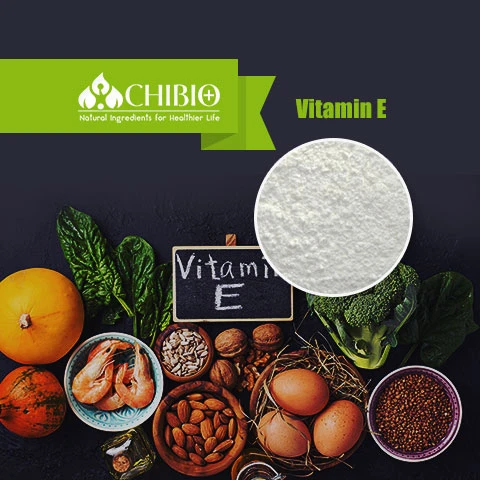Vitamin E
Vitamin E
Additional information
| Product Name | Vitamin E |
|---|---|
| Specification | Natural D-α-Tocopheryl Acetate Powder 700 IU |
| Cas Number | 58-95-7 |
| Appearance | White to flesh-pink free-flowing powder |
| Main Benefits | ✨ Powerful Antioxidant Protection |
| Main Applications | ✅ Dietary Supplements |
Product Details
🌟 Vitamin E Powder – Natural D-α-Tocopheryl Acetate 700 IU 🌟

1️⃣ Introduction to Vitamin E
Vitamin E is a fat-soluble antioxidant that plays a vital role in skin health, immune function, cardiovascular protection, and anti-aging. It protects cells from oxidative stress and free radical damage, making it an essential ingredient in food, supplements, and cosmetics.
Chibio Biotech offers premium, natural, plant-based Vitamin E Powder in the form of D-α-Tocopheryl Acetate Powder 700 IU, which is derived from vegetable oils.
2️⃣ Product Overview – Natural D-α-Tocopheryl Acetate Powder 700 IU
✔ Key Features
- ✅ 100% Natural, Plant-Based – Derived from vegetable oils, suitable for vegan & vegetarian products.
- ✅ High Stability & Bioavailability – Acetate form ensures longer shelf life and enhanced absorption.
- ✅ Water-Dispersible Powder – Easily dissolves into a uniform emulsion for food & beverage applications.
- ✅ Free-Flowing & Non-Agglomerated – Ideal for precise formulation in supplements & food fortification.
- ✅ Meets USP & European Regulations – Complies with strict international quality standards.
3️⃣ CAS Number & Chemical Information

- Vitamin E (D-α-Tocopheryl Acetate): CAS 58-95-7
- Molecular Formula: C₃₁H₅₂O₃
- Molecular Weight: 472.75 g/mol
This natural vitamin E acetate is more stable than free tocopherol while maintaining its full antioxidant power.
4️⃣ Specifications & Solubility
| Type | Appearance | Solubility | Assay (IU/g) | Loss on Drying |
|---|---|---|---|---|
| D-α-Tocopheryl Acetate Powder 700 IU | White to flesh-pink free-flowing powder | Dispersible in water | ≥700 IU/g | ≤5.0% |
- Particle Size: 99.69% passes through a 40-mesh sieve.
- Bulk Density: 0.3g/ml–0.55g/ml, ensuring easy mixing into formulations.
- Modulation: Forms a uniform emulsion in hot water with no separation.
5️⃣ Benefits & Functions of Vitamin E
✨ Powerful Antioxidant Protection
- Neutralizes free radicals, reducing oxidative stress.
- Helps prevent premature aging & cellular damage.
✨ Skin & Beauty Enhancement
- Promotes skin hydration, elasticity, and wound healing.
- Reduces wrinkles, scars, and hyperpigmentation.
✨ Supports Immune & Heart Health
- Strengthens immune defense against infections.
- Helps maintain healthy cholesterol levels & cardiovascular function.
✨ Anti-Inflammatory & Brain Function
- Reduces chronic inflammation, supporting joint & muscle health.
- Protects nerve cells, improving cognitive function & memory.
6️⃣ Applications of Vitamin E Powder

✅ Dietary Supplements – Capsules, tablets, gummies, and soft gels.
✅ Functional Foods & Beverages – Fortified juices, dairy, and plant-based products.
✅ Cosmetics & Skincare – Anti-aging creams, serums, and sunscreens.
✅ Pharmaceuticals – Used in medical formulations for neurological & cardiovascular health.
✅ Animal Nutrition – Essential for livestock growth, fertility, and immunity.
7️⃣ Why Choose Natural D-α-Tocopheryl Acetate Over Synthetic Forms?
| Feature | Natural D-α-Tocopheryl Acetate | Synthetic Vitamin E (DL-α-Tocopherol) |
|---|---|---|
| Source | Plant-based (from vegetable oils) | Petroleum-derived |
| Bioavailability | 2X higher absorption rate | Lower absorption |
| Antioxidant Potency | Stronger protection against oxidative stress | Weaker effect |
| Application | Preferred in nutraceuticals, functional foods, and cosmetics | Mainly used in low-cost formulations |
💡 Conclusion: Natural Vitamin E (D-α-Tocopheryl Acetate) is the superior choice for high-end supplements, cosmetics, and food fortification.
8️⃣ Why Choose Chibio Biotech?
- 🏆 8+ Years of Experience in Vitamin & Natural Ingredients.
- ✅ Certified Quality – Meets USP & European Regulations.
- 🌱 100% Plant-Based & Vegan-Friendly – Free from synthetic additives.
- 📦 Flexible Supply & OEM Customization – Available in bulk & private labeling.
9️⃣ Why Your Business Needs Natural Vitamin E?
🔹 Growing Demand for Plant-Based Nutrition – Perfect for vegan, clean-label, and organic markets.
🔹 Essential for Health & Beauty – A core ingredient in cosmetics, supplements, and pharmaceuticals.
🔹 Highly Versatile & Cost-Effective – Ideal for multiple applications with proven stability.
🔹 Long Shelf Life & High Absorption – Ensures maximum effectiveness & storage stability.
🔟 Call-to-Action: Get Premium Natural Vitamin E Powder Today! 🚀
Looking for high-quality Natural Vitamin E (D-α-Tocopheryl Acetate 700 IU) for food, supplements, or cosmetics?
📩 Email: sales@chibiotech.com
📞 Phone: +86 (0)532 66983270
🌍 Website: www.chibiotech.com
✅ Boost your formulations with Chibio Biotech’s premium plant-based Vitamin E! 🌱✨
Get in touch with us to boost your business

- Get Free Sample
- Get Step Quote
- 24/7 Service
- Customized Specification
- Confidentiality Agreement
Headquarter
Block B, Vanke Center, No.2 Heilongjiang South Road, Shibei District, Qingdao City, China 266033
Phone
+86 (0)532 66983270
Cellphone / WhatsApp / WeChat
+86 156 6577 2296
+86 133 8100 5417

